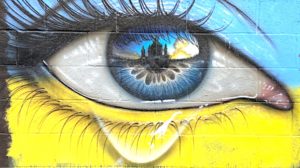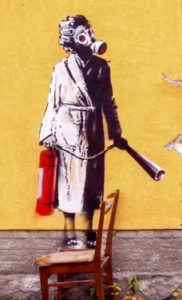Good News for Political Scientists! We are living in interesting times.
You and I find ourselves in the midst of an era of profound turmoil. After roughly 2.5 billion years of seemingly ineluctable progress, many of the defining features of our existence as human beings–our liberal democratic institutions, commitment to human rights, universal ideals, relationship with our earthly home, good health, and even our acceptance of scientific truth–are under assault. In the words of the paleongologist, Stephen Jay Gould, we are experiencing the explosive effects of a period of “punctuated equilibrium.” Who is to say that the world we cherish will be around in 50 years?
Still, I do not wish to bring you down. I have another piece of good news that I shall attempt to convey throughout this course. Nothing is inevitable. Thus, we may be able to claw our way out of this mess. There is room for hope.
As participants in these developments, we are also fortunate.
In ordinary times, it is hard to see the world as it really is. This is a particularly difficult task for people like us, the privileged members of privileged societies. By virtue of your presence at Notre Dame, you are now a member of the ruling class. In fact, one of Notre Dame’s greatest virtues is also one of its greatest weaknesses. Because Notre Dame provides you with a privileged education that is deliberately buffered (see Community Standards Du Lac) against the daily trials that most people encounter. At Notre Dame, the real world is a “foreign country.”
Nonetheless, in times of abrupt change and psychological stress, the most privileged members of society can be forced to ask hard questions about what matters most and what the future holds for both them and billions of other human beings. Whether you are religious or not, or whatever your relgious faith, these questions matter at our Catholic university. In fact, they should matter more than at any secular university. For my part, I affirm one Catholic (and non-Catholic), non-negotiable principle in all of my courses:
All human beings are endowed with instrinsic dignity and should be treated accordingly
I will encourage you to “think big” about politics and society. Where we are today is not simply the result of some virtuous act by white-wig-wearing aristocrats drinking port wine while writing flowery constitutions. Nor is it the creation of educated people who wrongly think they know more than their less-privileged fellow citizens. Rather, our political world is the product of countless, converging forces–good and dumb ideas, erratic decisions, violent movements, lucky accidents, and natural and self-inflicted disasters–that have passed before us for centuries.
The study of world politics is dauntingly huge. To make our task more manageable, I shall introduce you to a single theme that illuminates many of the features of our current condition. This theme is the ongoing, and necessarily conflictual, evolution and revolution of a novel form of political organization known as the Modern Nation-State.
By Modern, I mean the consequences of a revolution in epistemology, human identity, organization, and political reality that has come to fruition over (roughly) the past four centuries. By Nation-State, I mean a “symbolic community to which people voluntarily devote their primary political loyalties despite the many particularistic loyalties–religious, cultural, ethnic, political, social, economic, gender, and athletic–that otherwise divide them.” Modernity and the Nation-State are abstract terms. Still, they are useful tools. Like the best tools, they can help us make sense of our particular juncture in the long history of humanity. They alert us to the fragility of our world and the possibility that we may be the cause of its ruin. They can also give us hope.
My story is divided into five interlocking chapters. In the first chapter, Modern Politics, I introduce you to some basic concepts about modernity and the Modern Nation-State. In the second, we travel down the rocky road the West has taken toward a particular form of the nation-state: Liberalism. In the third, we consider an initially credible but ultimately failed path: Leninism. In the fourth, we confront the pathos and rage of people living in the fractured Postcolonial world of weak nation-states. Finally, we return to our starting point to examine the ecstasy and agony of the nation-state in an age of Global Instability.
I shall frequently refer to some troubling themes about our age, including:
The politicization of fact-seeking in modern democracies. If we can’t agree on facts, there can be no democracy. There is no such thing as an “alternative fact”!
The threat of populist politics. Populism is not another form of politics. It is anti-politics. In an extreme form, whether it is on the political right or the left, it can kill democracy.
The fact that, in our times, politicians, TV personalities, and social media moguls can make both highly-educated people and less-educated people in advanced democracies believe just about anything.
I am an ambitious teacher. My pedagogical goals extend far beyond introducing you to the field we call “political science.” I hope to persuade you to:
Pursue a “deep knowing” of politics, rather than “much knowing” (a distinction drawn by the Greek philosopher, Heraclitus
Defend arguments and persuade others that you are right. Or admit you are wrong when you are wrong. I have made a habit of being wrong.
Develop a critical perspective about everything you think you know.
Ask what it means to attend Notre Dame. You have self-selected to be here. This is no normal university. We are a utopian experiment!
The requirements for our course are HERE as well as on the right column. You are responsible for knowing all of the information on this page. I will change the syllabus and its assignments and readings throughout the semester. Thus, you will need to consult it on a regular basis.
I have a modest personal objective throughout our political travels. If I can challenge you to think about world politics in a new way, I shall be pleased.
Please leave your laptops, cellphones, video games, hidden microphones, NSA listening devices, FBI trap-and-trace hardware, and other digital weapons at home. Psychologists have demonstrated that you learn more by listening and taking notes the old-fashioned way. The only devices allowed in my classroom are your pens.
** All of the headers on this site as well as most of the pages are by street artists in defense of Ukraine **
